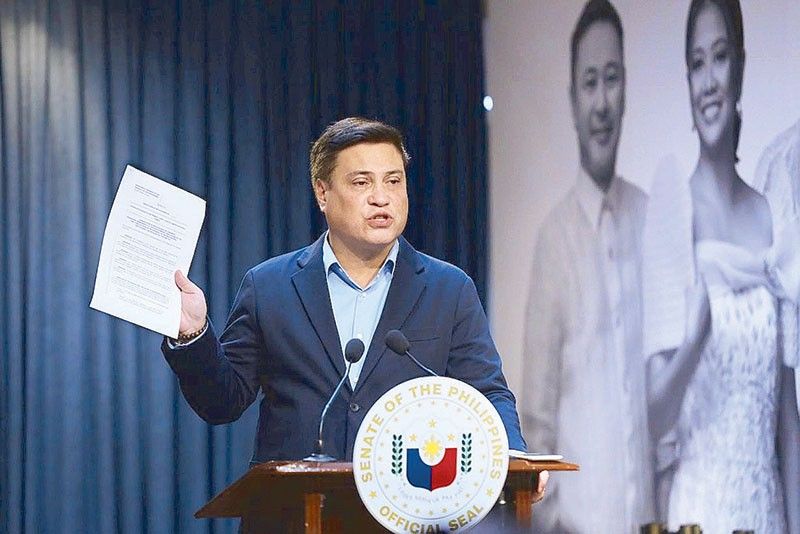Marcos bucks Cha-cha via people’s initiative

3 senators push Cha-cha by legislation
MANILA, Philippines — President Marcos has expressed disdain for the signature campaign to change the Constitution under the people’s initiative that he deemed “too divisive,” and has urged the Senate to take the lead in amending the Charter, or at least some of its economic provisions.
This was according to Senate President Juan Miguel Zubiri – citing his recent meeting with Marcos – as Resolution of Both Houses of Congress 6 was filed in the Senate. RBH6 aims to amend certain economic provisions of the Constitution simply through legislation.
RBH6 limits any Charter change effort to specific provisions that will open up public services, the education sector and advertising industry to foreign ownership.
Zubiri said he and Senators Loren Legarda and Sonny Angara filed RBH6 to avert a constitutional crisis amid the House push for Charter change and other senators’ opposition to Cha-cha.
However, Noel Oñate, lead convenor of the People’s Initiative for Reform Modernization and Action or PIRMA, said the signature campaign continues.
“This is to avert a constitutional crisis between the House of Representatives and the Senate. And to make it clear that there are no other planned provisions or amendments on any other thing but purely economic in nature,” Zubiri told reporters after he personally filed the resolution.
He said that after learning about the people’s initiative last Jan. 5, he immediately sought an audience with Marcos. He said he and the President met on Jan. 9 and later that same day with Speaker Martin Romualdez.
‘Heated discussion’
The Senate chief said his “colorful and vigorous discussion” with Romualdez “became quite heated.” He did not elaborate.
He said they met again on Jan. 11, this time with Special Assistant to the President Antonio Lagdameo Jr. and Senior Deputy Majority Leader Sandro Marcos present.
“I would like to thank the President for his comment that the PI is too divisive, and even mentioned news items from the media networks that he watched the night before,” Zubiri said.
The President, he said, was rattled by the controversy sparked by the signature campaign, specifically the allegations of bribery raised by some lawmakers.
Zubiri also recalled being instructed by the President to lead Charter change.
“I thank the President for this, he said ‘I used to be a senator, and as a former senator I will not allow’ anyone to undermine or diminish the power of the Senate.”
“The President told me and the Speaker, ‘why doesn’t the Senate take the lead in the discussions of the economic provisions and then you approve your version which the House can adopt?’ So that was the position of the President so that we will not put any more amendments that we think will make the people angry. So that was quite clear in the meeting,” Zubiri said.
He said the President had also made it clear he does not want full foreign ownership of land and other amendments that could disadvantage the people.
“He (President) himself said that is not possible. He said that and I quote the President, ‘this will give us problems in our housing program, it will increase tax rates and it will increase prices of land in the Philippines’.”
When asked if Romuladez was amenable to the idea, Zubiri said the House leader merely stressed that he wanted to amend the economic provisions of the Constitution.
“I hope the people who are listening will get the body language of the President on stopping the move. Well, I don’t want to put words in (the Speaker’s mouth) but according to the Speaker, in that meeting, the people’s initiative is moot and academic if it’s about economic provisions,” Zubiri said.
Congress won’t convene for a joint session for Charter change, he stressed.
While there are three modes of amending the Constitution – constituent assembly, constitutional convention and people’s initiative – Zubiri said the Senate may convene to pursue any of the initiatives without the chamber having to meet physically with the House.
“Actually, as far as I am concerned, it’s just a name which is constituent assembly. Former senator Frank Drilon has given this proposal and it can be that way. We don’t need to meet in one place to come up with a constituent assembly,” Zubiri explained.
“As far as they are concerned, this was also discussed in one of the committee hearings, I think Fr. (Joaquin) Bernas and some other constitutionalists (said) that it can be done that way. So we can meet here (in the Senate) and pass the resolution (with) 3/4 votes. They can meet there (in the House), pass the resolution as well (with) 3/4 votes,” he added. “But if they are different, the problem is, there will be an impasse and the constitutional reform will not be passed. But if they will adopt the Senate version, then there is no problem,” he added.
Passage by March
Zubiri hopes to see RBH6 passed “this quarter” or before the next congressional recess on March 22.
The Senate president said RBH6 would only need three-fourths or 18 affirmative votes, both in the subcommittee and plenary levels.
Under RBH6, the senators said there is a need to institutionalize the reforms laid down in the Public Service Act to liberalize industries, promote efficient service delivery and foster competition as an enduring policy.
“Our children deserve to have access to the best educational institutions, both Filipino and foreign, to ensure that they receive the best training to become globally competitive citizens in the modern world,” RBH6 read.
“The advertising industry currently already has foreign players and liberalizing the same is a logical and sound policy to attract foreign direct investment in that industry,” the resolution stated.
The resolution also added that “the nation’s economic policy must be reframed under the demands of this increasingly globalized age, while still protecting the general policy of Filipino-first that guides the economic provisions of the Constitution.”
Romualdez, for his part, voiced his “unwavering support for the Senate’s initiative to file a Resolution of Both Houses of Congress.”
“This resolution using the mode of constituent assembly is a decisive step towards amending the 1987 Constitution, particularly in terms of relaxing the economic provisions that currently restrict the entry of foreign direct investments into the Philippines,” he said in a statement.
The constituent assembly mode, one of the three modes in revising the Charter, underscored the House’s “commitment to a democratic and participatory process.”
“It reflects our collective resolve to address the long-standing barriers that have, to some extent, hindered our nation’s progress,” he said.
“Moreover, the synergy between the Senate and the House in passing this Resolution will send a strong signal of unity and purpose. It aligns with the aspirations of the proponents of the ongoing People’s Initiative, who have tirelessly advocated for constitutional reform,” Romualdez pointed out.
“We look forward to engaging in constructive discussions and working collaboratively with all stakeholders in this important constitutional endeavor,” Romualdez, congressman of the first district of Leyte province, stressed. — Delon Porcalla
- Latest
- Trending



























